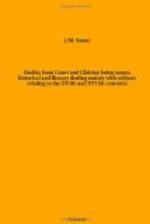Cologne, Strassburg, and his own native Nymwegen next came in for a share in the apostles’ labours. The Bishop of Trent begged him to come and found a college in his diocese; the Duke of Bavaria called upon him to organise the one he had already set on foot at Munich, and to establish another at Landshut. But Straubing, by reason of its extreme need, detained him longer than any of these places.
Charles V. had himself been mainly responsible for the worst of the difficulties and complications that existed at Straubing, on account of his famous interim, which granted to all, on his own personal authority, permission to communicate under both kinds, pending the decision of the Council of Trent on this point. Straubing had availed itself without exception of the permission, and even after the decision of the Council persisted in retaining the custom. A few priests had attempted resistance, but numberless apostasies and half an insurrection had followed on their action, and now the position had come to be regarded as impregnable.
Canisius made no attempt to storm the fortress; he arrived, and was gentleness itself. He had scarcely passed a week in the town when he was regarded as the friend and adviser of all its principal citizens. His sermons drew crowds as usual, and his instructions on the subject of Holy Communion, of which his hearers proved to be strangely ignorant, were continued in the confessional, and on every possible occasion. At Easter nearly the whole population approached the sacraments, and communicated without making the least difficulty, under one kind. The apostle, broken with fatigue, for he had preached throughout Lent, three times a week, besides catechising, visiting the sick, hearing confessions, and answering the objections of all who came to him, was yet beaming with joy, so markedly had his labours been blessed.
It would be superfluous to follow Canisius in his journey to Poland, in his fruitful sojourn at Augsburg, in his campaign against the ignorance of the clergy at Wurzburg, against the Calvinism of the Swiss Protestants. Everywhere the story is the same: ignorance, vice, and heresy fled before the bright light of his presence, and his wisdom provided, that where he had planted the good seed, others should follow him, to keep it watered, so that there should be no return to the former errors. Long after his death, the colleges of the Society which he had founded continued his work, and formed an efficient barrier against the modern spirit of revolt from authority and order.
If in a sense the old ages of faith were dead, the new age witnessed a wonderful resurrection, the effect of which is still going on in our own day. And the scourge of heresy wherewith the Church in Germany was scourged to its ultimate salvation in the sixteenth century, lies now a thing of nought, effete and all but lifeless, while the Bride of Christ has renewed her youth like the eagle.




